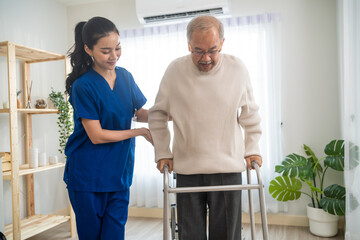Stroke sufferers are ladened with physical, cognitive and emotional challenges that restricts their movement and alters their ability to be fully independent. Caregiving is one essential way to provide support for stroke patients and it contributes significantly to their recovery process. In most cases, family and friends of stroke patients are not always able to perform the role of caregiving for their loved ones due to factors such as work, distance, lack of professional training or skill, and so on. Thankfully, there is the option of employing the services of a caregiver and this can help facilitate their recovery process in the following ways.
- Nutrition and Diet Support: Due to their condition, stroke patients are often placed on special dietary plans. This is to help facilitate their recovery, manage possible underlying health conditions and reduce the risk of recurrent strokes.Due to the loss of mobility in parts of their body, managing their diet in this way can pose a challenge of nutrition for them. The presence of a caregiver helps to provide a stroke survivor with the needed assistance in meal planning, adhering to the recommended diet by their healthcare professionals, meal preparation and feeding. This helps to ensure that the stroke patient is kept well nourished and in a state of health that aids their recovery.
- Communication Support: One of the impacts of stroke is the communication impairment and disability, such as aphasia and dysarthria. This impairment sometimes makes it difficult for stroke patients to understand others and communicate coherently without slurring their words. The presence of a caregiver provides the patient with a dedicated assistant who can patiently communicate with them in a way they can understand, help to decipher their non-coherent communication and also assist them with medically approved speech therapy exercises to improve their communication impairment.
- Medication Support: Stroke patients are often placed on a medication plan. However, their condition may not permit them to efficiently administer their own medication. With a caregiver, not only is this burden and inconvenience removed from them, they are able to judiciously keep up with their prescriptions. Caregivers also monitor their patients for possible side effects or adverse reactions in order to report back to their patients medical professionals and forestall further damage or fatality.
- Physical Support: Stroke survivors can benefit a lot from having a caregiver to help them out with daily living activities (such as bathing, using the toilet, making the bed, dressing, grooming, etc), physiotherapy exercises aimed at improving their mobility, and essential body movements which they may not be able to do on their own.
- Emotional Support: Caregivers are able to provide their patients with emotional support such as offering company in the absence of family and friends, offering encouragement during times of frustration or discouragement and providing a patient listening ear when they want to express their feelings. While this does not replace therapy, it helps to provide a form of emotional therapy which stroke survivors often need during their battle with stroke and recovery process.
CONTACT VITALIS HEALTHCARE
At Vitalis HealthCare, our team of certified and experienced professional caregivers and registered nurses are efficiently trained to provide you with the best quality and compassionate home care services.
If you would like to hire a professional caregiver or certified nursing assistant, feel free to reach out to us through any of our contact details outlined below.
With us, you are in safe, competent and compassionate hands.
Phone Number
240.716.6874
Email: info@vitalishealthcare.com
Location
We provide our services in every county in the State of Maryland, United States of America.
Office Address: 8757 Georgia Avenue Suite 440 Silver Spring, MD 20910


